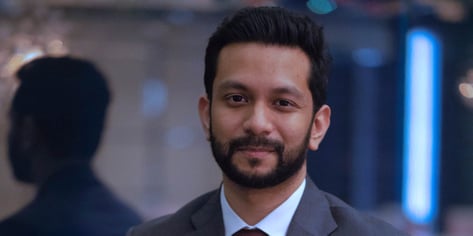What's it like to study International Relations online? Read our Q&A interview with MA International Relations graduate Abir Chowdhury.
Abir Chowdhury is a graduate of the Queen Mary Online MA International Relations and now works as a Social Protection Consultant for The World Bank. We spoke to Abir about his experience studying international relations online and how the online course has helped him develop his career.Tell us a little bit about yourself and your background?
Abir: I am an independent consultant in the international development sector based in Dhaka, Bangladesh, with experience working for global development consulting firms, multilateral development organisations, and non-governmental organisations.
I work primarily in the areas of agriculture and food security, digital development, social protection and migration, and access to finance for micro, small, and medium enterprises.
My technical expertise lies in private sector development, project management, stakeholder engagement, proposal development, and communications.

Twitter handle: @AbirAChowdhury
Linkedin: linkedin.com/in/aachowdhury
Website: www.abir-chowdhury.com
Why did you choose to study online with Queen Mary?
Abir: Having been in the international development scene already, I realised the importance of a master’s degree, and more so from a prestigious university, especially if you wanted to get into the big bilateral or multilateral organisations.
I had a boss in my first job who was doing his master’s online from one of the University of London universities, and he suggested I checked out the various courses available online.
The lure of a foreign master’s degree from a reputed university, coupled with the fact that I could continue to work because of the nature of the course, convinced me this was the right choice for me.
What motivated you to study an MA in International Relations at master’s level?
Abir: I completed my undergraduate degree in Economics, and I have always had an interest in globalisation and international relations. Since I was a development practitioner, I wanted to go for a course that best aligned with the work I was doing while bolstering my employability in the future.
Develop your analytical skills and international relations knowledge with Queen Mary Online's MA International Relations. Study part-time and online:

What did you enjoy most about studying International Relations and was there anything that surprised you about your studies?
Abir: The dissertation was by far the most enjoyable and rewarding but challenging at the same time. From choosing the topic to getting over the line, it was an eventful journey that required several consultations with the supervisor, who went out of his way to provide support to us.
I was also impressed with the rich content of the coursework. Finally, the assignment-based scoring was convenient for me because of my day job because I could set aside separate time in the evenings and on weekends to focus on the assignments.
Can you describe your career path to date and what you’re up to now?
Abir: I am currently consulting for The World Bank on social protection and migration in Bangladesh, and the Global Knowledge Initiative to incentivise innovations for humanitarian response challenges in Bangladesh.
I have previously managed the Bangladesh program at the British Asian Trust, consulted for DAI and UNICEF, and worked on several USAID-funded projects, including holding full-time roles at nonprofits such as iDE (International Development Enterprises) and Helen Keller International.
How do you think the course will help you with your future career plans?
Abir: It will hopefully have a massive impact. Most global development organisations are always looking for a master’s degree, and it helps more when you have it from a university like QMUL and in a subject such as international relations, which goes well with what I am doing in my professional career.
What has the support been like, both during the application process and your studies?
Abir: They have been super helpful from the start. They are fully aware of the challenges of an online course and are therefore prepared for it and make sure they have the right tools to equip the students to overcome the hurdles. Most importantly, they are quite responsive and extremely patient when it comes to explaining solutions.
How have you found balancing work, social life and studying as an online student?
Abir: The dissertation was hard, but in general, the assignment-based approach helped a great deal. There are other courses where you have to appear for final exams for each module, and while it has its merits, the QMUL approach is better suited for working professionals who want to pursue a degree at the same time.
What are networking opportunities like for online students?
Abir: For those who are able to fully immerse themselves in the course and spend time on it beyond the coursework, you can network with tutors who are well-qualified to advise on career options.
My cohort also included students who were already doing lots of exciting work professionally, and there was a general openness to networking, so I would recommend reaching out directly to build connections.
Would you describe the course as a good investment?
Abir: Absolutely. It might turn out to be one of the best value-for-money decisions I have made in my life.
What advice would you give to prospective student considering the MA International Relations and Queen Mary Online?
Abir: How can they make the most of their experience? I’d highly recommend they take it on if it aligns with their broader career ambitions.
No online degree will be able to fully replicate an in-person one, so make sure your expectations are realistic. But there are plenty of positives to getting a degree online, and I think QMUL has hit all the right notes when it comes to designing the course.
Thank you!
Learn to think, speak, and write critically about international issues with Queen Mary Online's MA International Relations. Study 100% online and choose from two start dates a year: